-

The kids held out their green beans today and we laughed in celebration over them. It was the second collection of beans they’d made since I’d said, “I think the bean plant is done for the season.” The harvest we cooked for lunch was yet another lesson for me under the tutorage of our bean bush. For months I’ve been picking beans I didn’t believe would ever grow.
It was actually friends who sowed the seeds in our garden that became our bush of a thing. We didn’t know what to do with the tall, leafy, stems, so they just grew together until they became one giant plant. It overtook the pepper plant, tipped over trellises, and then just kept growing.
The bean bush’s unruly tangle of stalks meant that when it was harvest time, the green beans had to be hunted for, which also meant more fun. Green beans, where are youuu? the baby would say-sing, and every bean we found was a wonderful surprise for everyone, but to me most of all.
See, I’d checked our Great Fruit and Vegetable Guide, and had seen the season for harvesting started before our bush showed any signs of beans. “They should’ve grown by now,” I told everyone, like the expert gardener I am not. One of my girls though, she’d walk outside with a watering can and come back insisting she saw baby beans growing. I told her she probably just thought that’s what they were. Not too long after, I was down in the garden, picking beans. God has had words for me by that bush since.
He’s taught me about pruning, how from the outside it looks like it’s killing the plant. I’ve followed the instructions for doing it, half-expecting to come back to a dying bush, only to find more beans. How could things in our lives that are so painful make us more fruitful, I don’t fully understand, but they can and do under his hand. (John 15)
I’ve learned that sometimes, you need to hunt for signs of growth and grace. In the day to day I often miss God is working in my kids, in me. Perfectionism and ungodly expectations means I look at the book and scoff at the plant. But while signs of his grace in and around you may not be immediately obvious, they are still evidence of his work. When you find them, rejoice. Laugh and shout like a kid who just found a GINORMOUS green bean.
I’ve learned good fruit is often borne in unexpected places, ways, and people. We may assume certain sets of circumstances, methods, personality-types, and backgrounds are the ones we want for serving in God’s Kingdom. He may think otherwise.
Most of all, I’m learning about the patience of God who does not give up on us. He won’t uproot a plant just because the tiny growing shoots aren’t obvious yet. He waters, and slowly but surely he makes us grow. His declarations are more certain than the accuser’s and he’s promised that those who belong to him will surely bear eternal fruit.
Part of God’s good work is his invitation for the impatient to come observe his ways. To see how he is so unlike us, possibly how unlike who we imagine him to be. And in the grace of harvesting where we did not sow, he teaches us to wait.
From one of the impatient ones, for the soily lessons about our most trustworthy and patient Gardener, and for providing vegetables my kids love to eat, thank you bean bush. Sorry I doubted.
P.S. Cucumber plant, this post could have been about you because I really did try to put your roots back in after daughter-gardener pointed out the small, spiky green ovals growing off your dry stems, but it was too late. You’ve taught me too though, and I’m learning to wait.
-
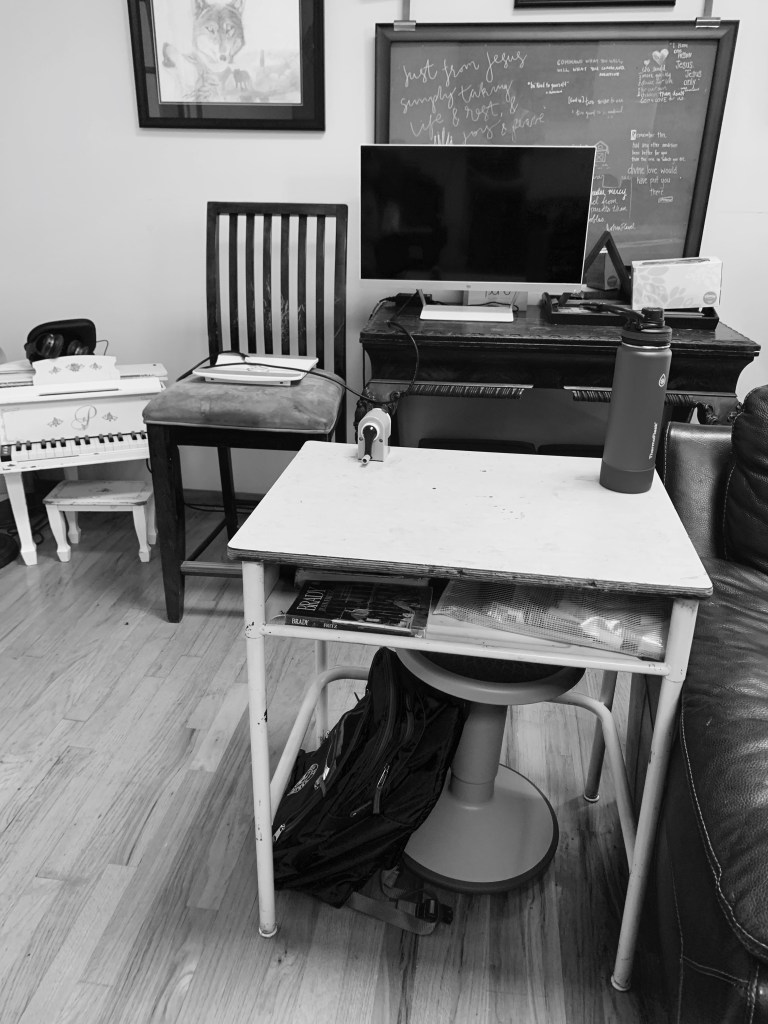
The last 5 days of remote learning have made me want to cry more times than homeschooling for 4 years ever did. The girls really have been great and their teachers are wonderful. Still, it’s stressful for everyone all around.
Distance learning isn’t my first, or even second choice, but isn’t that what life is like these days for everyone? We’re educating kids, celebrating birthdays, getting married, birthing babies, grieving deaths, and worshipping together the best we can given the circumstances. Yet when it comes down to it, what we end up settling with can feel like just that— settling.
…
Ours is not the only time and place the people of God have been asked to live, work, love, and worship in less-than-ideal circumstances.I think of the prophet Jeremiah. Build houses! Plant gardens! Start families! Pray for your city! Seek God!, he instructed. Not strange things, except that God’s people were to do this in Babylon, the land of their captors.
It is to these exiles that God declared, “I know the plans I have for you. Plans to prosper you and not to harm you, plans to give you hope and a future.” (Jer. 9:21). Deliverance would come, but not for another 70 years. Until then, they were to live life where they found themselves. And as they lived, they were to trust.
Maybe our times are not as unusual as we think.
…
On the framed glass my daughter faces as she sits in her virtual classroom are words by Charles Spurgeon.“Remember this, had any other condition been better for you than the one in which you are in, divine love would have put you there.”
As we gear up for a week of school, they are for me. They tell me, Yes, you are frustrated, sad, pleading for all this to end soon, and rightfully so. But don’t forget you do this as one who is loved by the Sovereign of the universe.
Beloved, we are not living God’s contingency plan.
We walk into the week loved by a God who is committed to our good.
Our children sit down for class beside the One who is working all things for their flourishing even now.
So here’s to the next 5 days of Google Classroom and Zooming kids. To leaning on grace and trusting his ways, here where divine love has placed us.
-
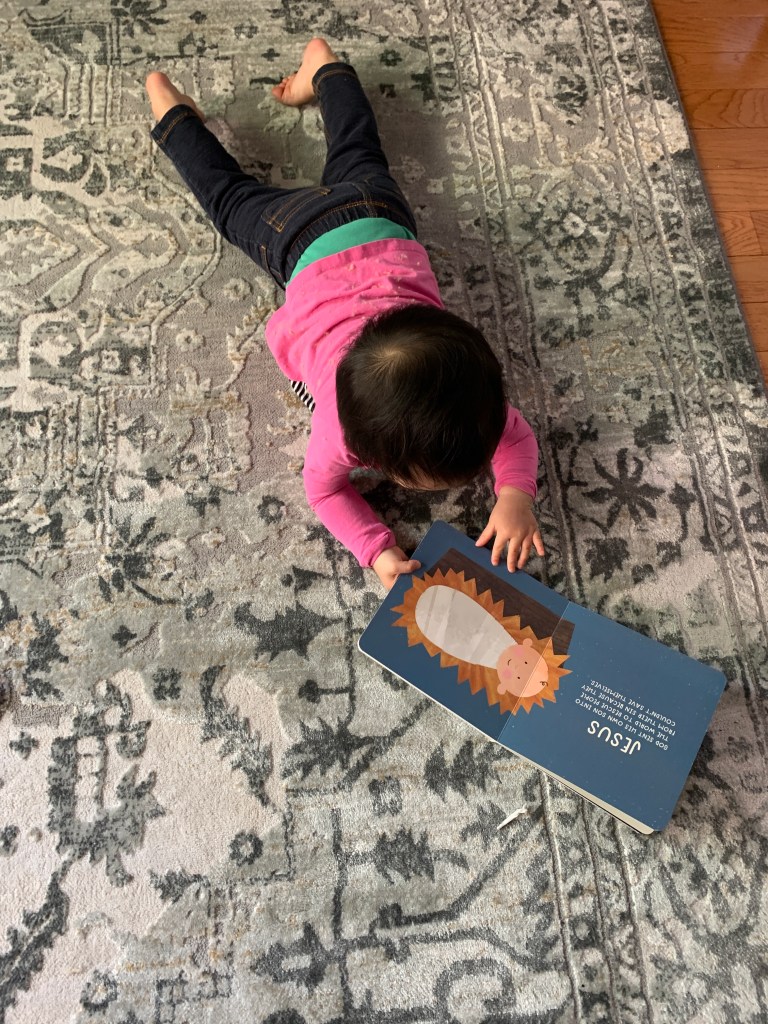
The cousins ran around today, occasionally coming to the dining table to graze on leftovers, settle on laps, and complain about what someone else did or didn’t do. The adults had lingered after the meal, our conversation meandering as it usually does. We talked about old computer games, the Atlantic article about the Romanian orphans, and the way our churches have talked about race these past years. It was precious time. With both healthcare workers and at-risk family members, we’ve only been reunited recently after months apart.
Later as I put our youngest down for a nap, I thought about how it’s been hard to pray, to feel God is near and hear him in his Word. He had started some deep work in me a few weeks into quarantine as I processed a slow but long-coming burnout. But the past few weeks I’ve only been able to think and feel over issues of racial injustice. With my sweet girl snuggled on my chest, I wondered how I could approach God about personal restoration while engaged with the pressing issues of injustice in our country.
I swayed with baby girl in the carrier, and the thought came, gently.
“You care about both. Why can’t I?”
With that came a reminder that these last few weeks, I had cared for the little one in my arms. If I had space to love my children while lamenting and responding to systemic racism, why wouldn’t God be able to care for each of his own while breaking down strongholds of evil in the world?
These days, we are surrounded by the hurting. Our family has been praying for exhausted black friends and neighbors. Those who’ve felt the effects of racism their whole lives— “I can’t sleep,” she told us, “I’ve had nightmares. It could’ve been my husband.” We are remembering those who have died, and are still dying, from Covid-19. We pray by name for their family members who are reeling from grief. During protests in NY, we prayed for a neighbor in a local police precinct working nonstop and an Army friend, a husband and dad just returned home after months overseas, who was almost deployed to the protests. Our church hasn’t met physically for months and we fear for those drifting from the faith. We continue to mourn with others who were suffering before Covid-19 and George Floyd’s murder. Cancer, trauma, sick babies, marital strife, and mental illness don’t relent for pandemics and protests.The needs are so great it is hard not to feel like it’s either/or. The world is constantly telling us we need to choose sides for those we care about, choose which one of God’s commands we should obey. Do you care about the health of the immunocompromised or the historic oppression of blacks in America? Do you tend to the flock God has given you or do you honor his image bearers outside church walls? Do you care about your physical neighbor or the people Jesus said was your neighbor— the person in front of you or the needs of marginalized communities? Do you seek to be an agent of change in the world or a faithful mom at home? Do you want mercy or justice? Do you pray for them or do you act?
This is a trap.
God does not pit the cries of the hurting against one another in a cosmic duel. He is not conflicted in himself. He does not need to simplistically choose the more worthwhile of two good causes or the lesser of two evils (though, admittedly, sometimes we do). His love, power, and ways have no limit, and as we consider who he is, he destroys the false dichotomies we too easily take as a given.
Consider that the God of Scripture is the God who punishes the wicked AND turns persecutors to martyrs. (Ex. 34:7, Acts 9)
He tells his people to act justly AND to pray without ceasing. (Is. 58, 1 Thes. 5:17)
He responds to individual sufferers AND the collective cries of the oppressed. (Ps. 28, Ex. 2:24)
He calls us to care for the widows, orphans, and strangers AND to be diligently faithful in our own homes. (Deut. 10:18, Eph. 6:4, Tit. 2:3-5)
He teaches us to be silent before him at matters too great for us AND to speak up for those who have no voice. (Ps. 131, Prov. 31:8-9)
He is full of grace AND truth. (Jn. 1:14)
He loves justice AND mercy. (Ps. 33:5, Mic. 6:8)
He upholds the sparrows AND the universe. (Matt. 10:28, Heb 1:3)
I know this isn’t as simple as it looks on paper, that walking in the world requires discernment and wisdom. That we need nuance and God’s voice as we make difficult, sometimes heartbreaking, either/or decisions. Still, I want to be fiercely both/and in all the ways that reflect him.
So by his grace, I will pray for the safety of my NYPD neighbor and for police reform. I will keep learning and educating, preparing the summer self-study material my daughter asked for on African American history, and I will step back from conversations when I don’t yet have the weight of experience or knowledge to contribute. I will ask God to restore me from burnout and for the healing of the nations. l will seek his help to be faithful in keeping place and to leverage my place for his glory. While considering with others around the table what God would have us do outside of my home, I will serve brunch and referee sibling fights inside it.
I am loved by the God who loves the world. And in this knowledge I will rock my baby to sleep as I pray for his justice to roll down like waters, his righteousness an ever-flowing stream.
-
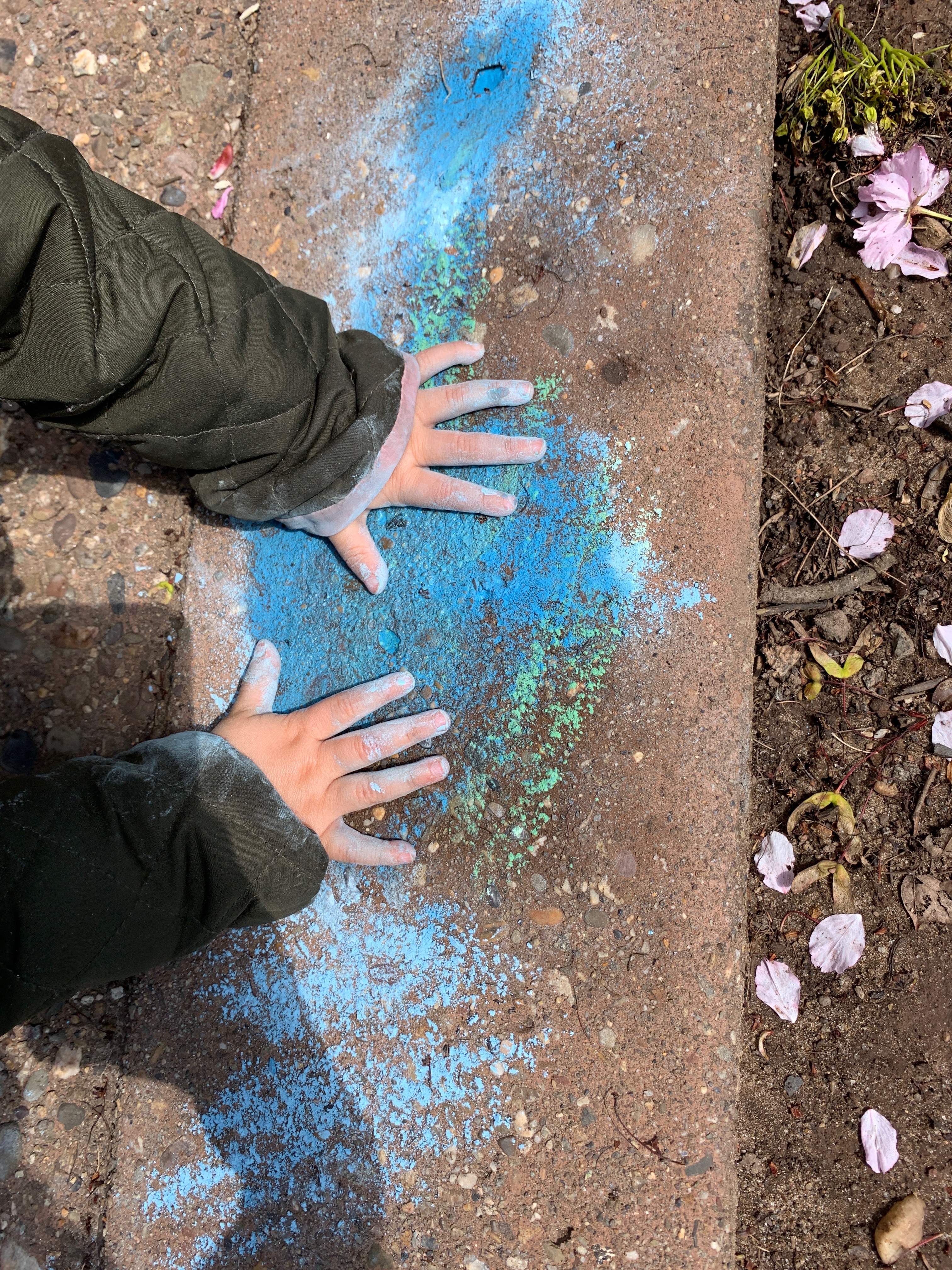
Oh! I heard surprised delight in his voice. Quick girls, come look! Jeff called, urgent yet tender. We left what we were doing, scrambled into the kitchen, and followed his gaze through the slatted blinds. I picked up our three-year old so he could see the feathered, fuzzy head of a baby sparrow perched on our windowsill.
It sat there unaware of our family huddled over the sink on the other side of the glass. It must’ve fallen out of its nest, Jeff thought aloud. But when I raised the blinds, it flitted, first to a nearby tree where an adult sparrow sat, then away and beyond our view. It was off to bear witness elsewhere.
~~~
Jesus once taught about sparrows. Not one of them falls to the ground apart from your Father, Matthew records him saying. Not one of them is forgotten before God, wrote Luke.
It’s interesting because he could’ve phrased it as a universal blanket statement that would be just as true. “Every sparrow is remembered” or “all sparrows fall only within his knowledge.” Instead, he spoke in the negative. I think it was to make sure we know that with God’s care for those who run to him, there are no exceptions.
It’s as if Jesus knew there are those of us who would read, “God loves the world” and think, of course God’s love is for all people— just not me. Like he knew there would be moments we feel, of course God’s care never ceases in theory — it just kind of has right now. So Jesus says: No, not one sparrow is forgotten by your Heavenly Father. No, not one sparrow falls apart from him, and the good news is that you are of more value than many sparrows.
I don’t know if things have felt noisy to you lately, but they have for me. My thoughts fly disordered between how a grieving friend is doing to the theological problem of suffering to NY Times headlines to what prominent Christians are writing to whether or not my faith will endure.
I love theology and my mind constantly turns over truths, analyzing, weighing, and applying them. But I’m coming to recognize that sometimes we can only hold one or two thoughts in view at once. This is one of those times for me. So I’ve been asking God to cut through the noise and simply remind me of his love for me. And as I pray for the sick, grieving, serving, and isolated, I’ve been asking God to let loved ones know they are loved by him, because truly they are.
JI packer wrote in Knowing God,
“What matters supremely, therefore, is not, in the last analysis, the fact that I know God, but the larger fact which underlies it—the fact that he knows me. I am graven on the palms of his hands [Isa. 49:16]. I am never out of his mind. All my knowledge of him depends on his sustained initiative in knowing me. I know him because he first knew me, and continues to know me. He knows me as a friend, one who loves me; and there is no moment when his eye is off me, or his attention distracted from me, and no moment, therefore, when his care falters.”
Even as we struggle and grapple to make sense of our competing thoughts, growing and needing to grow in our knowledge of him, what matters most is that he knows us. He knows us and loves us. His care shown in creation, his gift of breath and life, his burden-bearing on the cross. These all testify to God’s unwavering love for us and those we love.
Even the birds beckon, Come and look.
The older saint you love in the nursing home— not forgotten by him.
The prodigal living under your roof— not out of his reach.
Your grieving friend and exhausted health care co-worker— never out of his mind.
Your sick family member— there is not a moment when his care falters.
And you— worth far more than many sparrows.
-
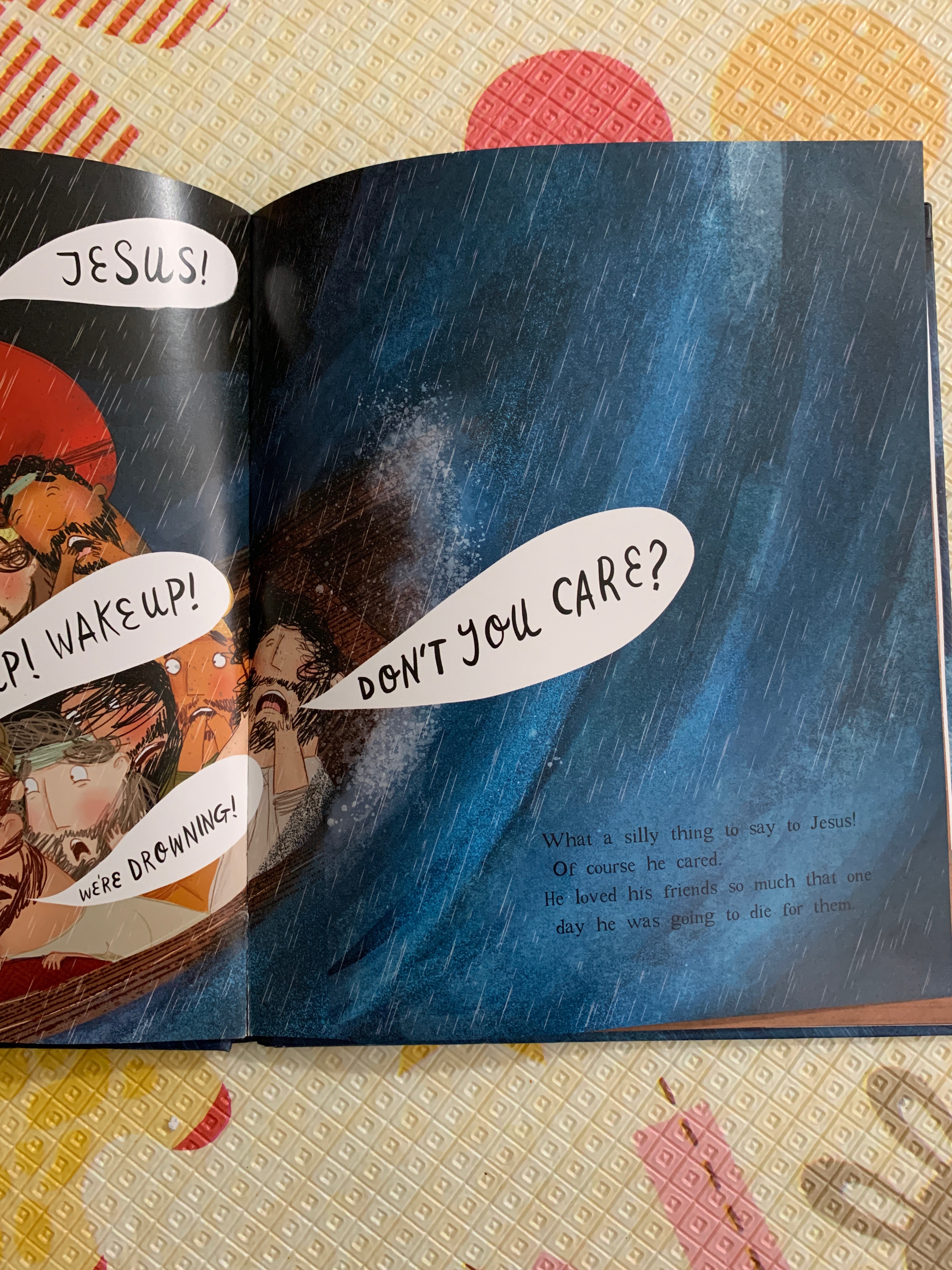
A few months ago, God said no. I’d been praying he would stop something from happening, something that would harm people I care deeply about but was powerless to control. But what I feared might happen did happen, and it sent me into a funk.
This isn’t my first encounter with unanswered prayer, but this one hit hard. Perhaps because I was weary. Perhaps it was because it seemed like all God had to do was one simple thing and all would be well. Now because he didn’t, people would suffer for it. So, echoing Jesus’ storm-tossed disciples, I leveled my own charge against God, hurling it as a question.
Don’t you care?
Then, I didn’t rage, I withdrew. My anger came out in the prayers I didn’t pray. God will do what he will do, for his glory, I know. Why bother if he won’t answer?
I’ve been fighting for faith and losing.
~~~
Hard questions aren’t new to people of faith. It is appropriate for those who believe in a God who is both loving and powerful to wrestle with questions about the presence of suffering in his world. Scripture is full of such questioners: psalmists, prophets, Job, to name a few. Martha, the sister of Lazarus too.
Jeff spoke today on the raising of Lazarus, and of Jesus’ lingering when his friends called for him to heal the dying man. Jesus arrives, too late and without apology, and the grieving sister’s words spoken at Jesus’ feet resound with me.
“Lord if you had been here my brother wouldn’t have died.”
Her words are an indictment. Jesus, you could’ve done something. You say you loved him, but you didn’t answer.
The writer of the gospel seems to anticipate this apparent contradiction between Jesus’ love and his purposeful delay. He gives us insight on Jesus’ intentions up front: “Now Jesus loved Martha and her sister and Lazarus. So, when he heard that Lazarus was ill, he stayed two days longer in the place where he was.”
Jesus didn’t linger because he didn’t care. He loved them, so he stayed, and his friend died.
Not but, so.
As hard as it was, Jesus’ love would lead Martha to deep loss. His love meant he’d mourn by her side. His love also meant in due time he’d deliver her out of her pain into joy. Soon he’d be the one to die and rise again, all for this love.
This difficult word is written for we who wonder if the unanswered prayers to spare us from suffering are a sign of God’s indifference. “So” tells us that our trials aren’t due to God’s anger or his cooly calculated plans for his glory. All things in his plan, even our suffering, comes from perfect love.
Jesus’ love for us led him to his own crucifixion. And his love now leads us to and through our own crosses. “Remember this,” Charles Spurgeon once wrote, “had any other condition been better for you than the one in which you are, divine love would have put you there.” We may not understand his ways, but we can be assured of his heart.
The word of God has much to say about suffering, and in the end there is no simple answer. There certainly is no answer that doesn’t require faith.
I still don’t understand what God is doing. I still don’t know how this story will unfold. But I needed the assurance of Jesus’ love-driven “so” today. This way, whatever happens and however difficult it may be, I’ll know this: It won’t be because he doesn’t care, it’ll be because he does.
-
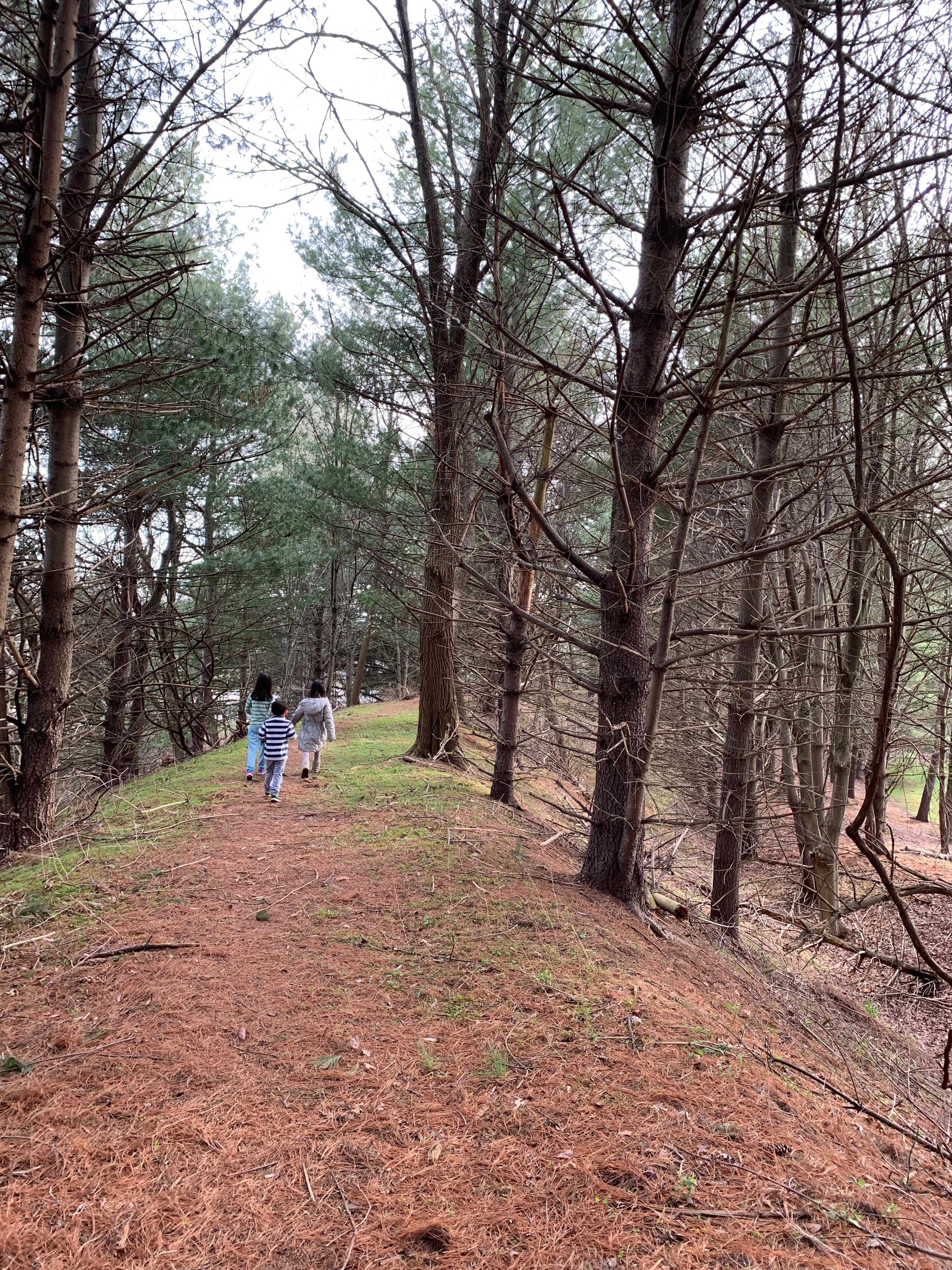 Our current reality looks like that of countless other families. Remote schooling, staying in, praying for loved ones working the hospital wards, praying for those we know with sick family members. We are trying to be vigilant, adjusting to this “pause”, missing our church and friends.
Our current reality looks like that of countless other families. Remote schooling, staying in, praying for loved ones working the hospital wards, praying for those we know with sick family members. We are trying to be vigilant, adjusting to this “pause”, missing our church and friends.There are moments of joy at home, and these are gifts. Reminders of God’s continued goodness to us even now. There’s news of heroism in the hospitals, stories of courage and selflessness. But over it all is a palpable heaviness. I am bracing, with millions of others, for worse to come. For many the worst they feared already has arrived.
We all feel the shadow of death upon us.
Ever since the rebellion of our first mother and father, death has loomed large over humanity, and we have lived in its shadow. For those of us who are anxious, its reality has always been on the forefront of our consciousness. Even while walking through green pastures and by quiet waters, the mountain Death has been in our periphery, our worst fears lurking in its darkness. We’ve always been aware we are inching our way toward it, towards death— our own or that of our loved ones.
For others, the reality of death only hits home occasionally, when our own health falters or someone we know passes away. In this season though, waking and sleeping to news of COVID-19 ravaging the world, our country, our cities, we can no longer push aside the reality of our fragility and mortality. We fear for our parents, our children, our friends, ourselves.
The truth is, tomorrow has never been promised to us. We’ve always been surrounded by dangers on every side, and from our first newborn cry been headed towards our final breath.
We’ve been walking through the valley of the shadow of death all along.
But as King David declared when he sang of walking through the same way, our Shepherd has faithfully kept watch over us. Even when we’ve foolishly thought ourselves alive and safe by our own doing, he has protected us. While we’ve been unaware, he has led us, gifting us each day out of his good pleasure.
And he has done more than just helped us navigate the darkness. To those of us living in the land of darkness and the shadow of death, Christ’s came to rescue (Mt. 4:16). His coming was as the dawning of the sun, and though death still destroys, it is no longer the final victor.
So yes, we’ve been walking through the valley of the shadow of death all along, but the good news is that there’s another mountain, and the one who conquered on Calvary now casts his light upon us. Therefore, we number our days, knowing they are as fleeting as breath, but do so with great hope. And my prayer is that we, that I, would not waste this time of uncertainty and fear by not turning to the Shepherd of our souls.
Believers, the fact that we still have life and breath means God has a purpose for us, an urgent and holy calling to love others and to glorify him. There is work left to do, and he bears us up and will walk with us even in the dark days ahead.
Beloved prodigals on the run, perhaps without the distraction of busyness and leisure, you are being forced to reckon with life’s bigger questions. You have been granted today because he is patient and merciful. Our Father waits to be gracious to you, and we long to celebrate your return. Why do you delay? Would you trust the one who made and loved you unto death? Turn to him in faith and see how he will walk you to the end of your days and beyond.
Anxious friends, who’ve long felt the shadow upon you and feel like you can barely see now. Look to the one who is the Light. Know that through our struggle to trust Jesus daily, he has been training us for such a time as this. Let us fight to be anchored in the truths that have steadied us through the years and faithfully proclaim them now. He still promises peace beyond understanding. He still cares for us as we bring our fears to him. He still is Conqueror. He still is our good and wise King.
And Good Shepherd, in this present darkness we cry out to you for mercy. You who laid your life down for your sheep will not abandon us now. For your name’s sake, lead us through this valley until we reach the city with no sun or moon, where your glory gives its light and its lamp is the Lamb (Rev. 21:23).
-
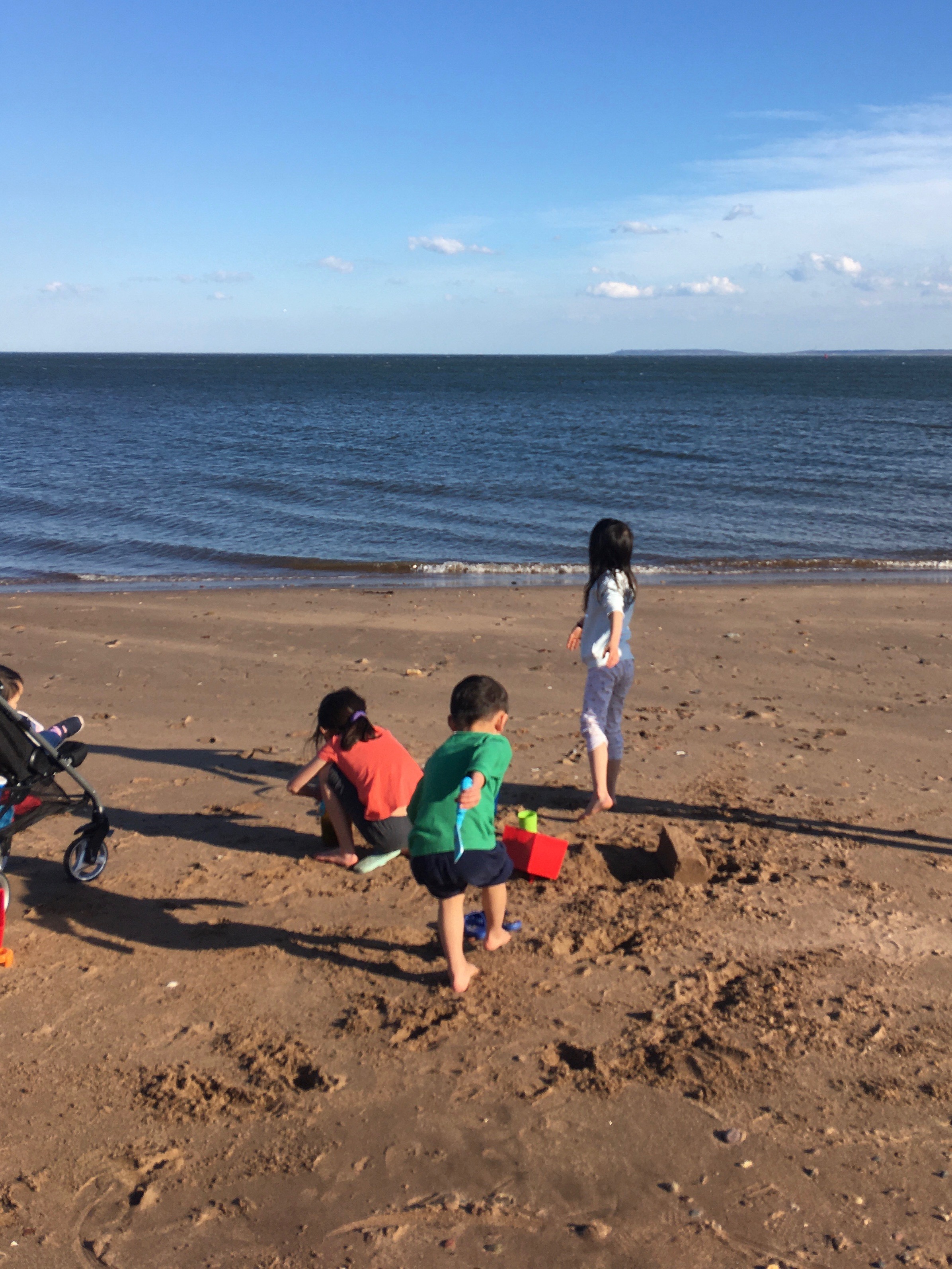
It was good to be out for a few hours today. It was good for the kids to be under the clear sky discovering the ocean (the baby), making castles (the big girls), and throwing sticks at the waves (the boy). It was good for me to breathe deep, feel deep, and sense the darkness give way a bit.
I cried over my baby girl yesterday as I put her to sleep. Her folded hands rested tenderly on my neck and as her breathing deepened I thought of how quickly a year has come and then gone. I cried because I haven’t taken every moment in, because I’ve been restless to do other things and missed out. I cried because as sweet as these moments are, there’s a sense that they decay a bit, like old reels of film, as time passes. They’re never the same when we relive them in our minds, and that made me sad.
I heard a writer say once that all true stories are sad stories, even the happy ones, because they’re over. These good days will pass, was my sentiment, and I mourned for what I haven’t even lost yet. I probably also cried because my heart has been heavy, and fleeting moments of joy seemed too weak to withstand the hard things.
But today though, out in the open air, I enjoyed the sweetness of memory-making without the sting of decay. I was reminded that the feel of my toddler’s hand in mine, the goodness of looking at my boy’s sand-covered toes, the castle moat filled with carefully collected rocks— they are realer and truer and more lasting than I know.
Because though there are hard and horrible realities in this world, they will not last forever. And when Jesus returns, it isn’t our moments of happiness that will feel fleeting. The Bible says it’s our present trials that will seem light and momentary on that day.
In contrast, the goodness of God in his creation, our deep enjoyment of one another as image bearers, moments of comfort, rest, and his Presence— these are not as fleeting as I may feel. They are meaningful foretastes of the world that will be, a world without shadows, a world without decay, promised to all who trust in Christ.
God sends us the stuff of the world— things we can feel and taste and see— to remind us that as surely as his goodness still fills the earth, the World we await is realer than real and surer than sure. The Christian hope is not to just escape this world, it is the restoration of all things when Jesus returns; a new Heavens and a new Earth is coming, so real that this life in comparison would have felt like a dream. And God fortifies our hope for this reality as we look at the things of this world with eyes of faith.
I’d like to think that in ages to come, these passing moments with my baby and today’s time outside on the beach will not diminish but grow in significance. That as we all look back, we will find the moments we grieve losing were not actually lost to us. Perhaps we will see them with more clarity, not less, as we understand them as lovingly crafted by God so we would not lose heart while awaiting the happiest of days. Maybe then we will know our sweet moments as they truly were, clearly and in living color, even better than we’d known at first.
-
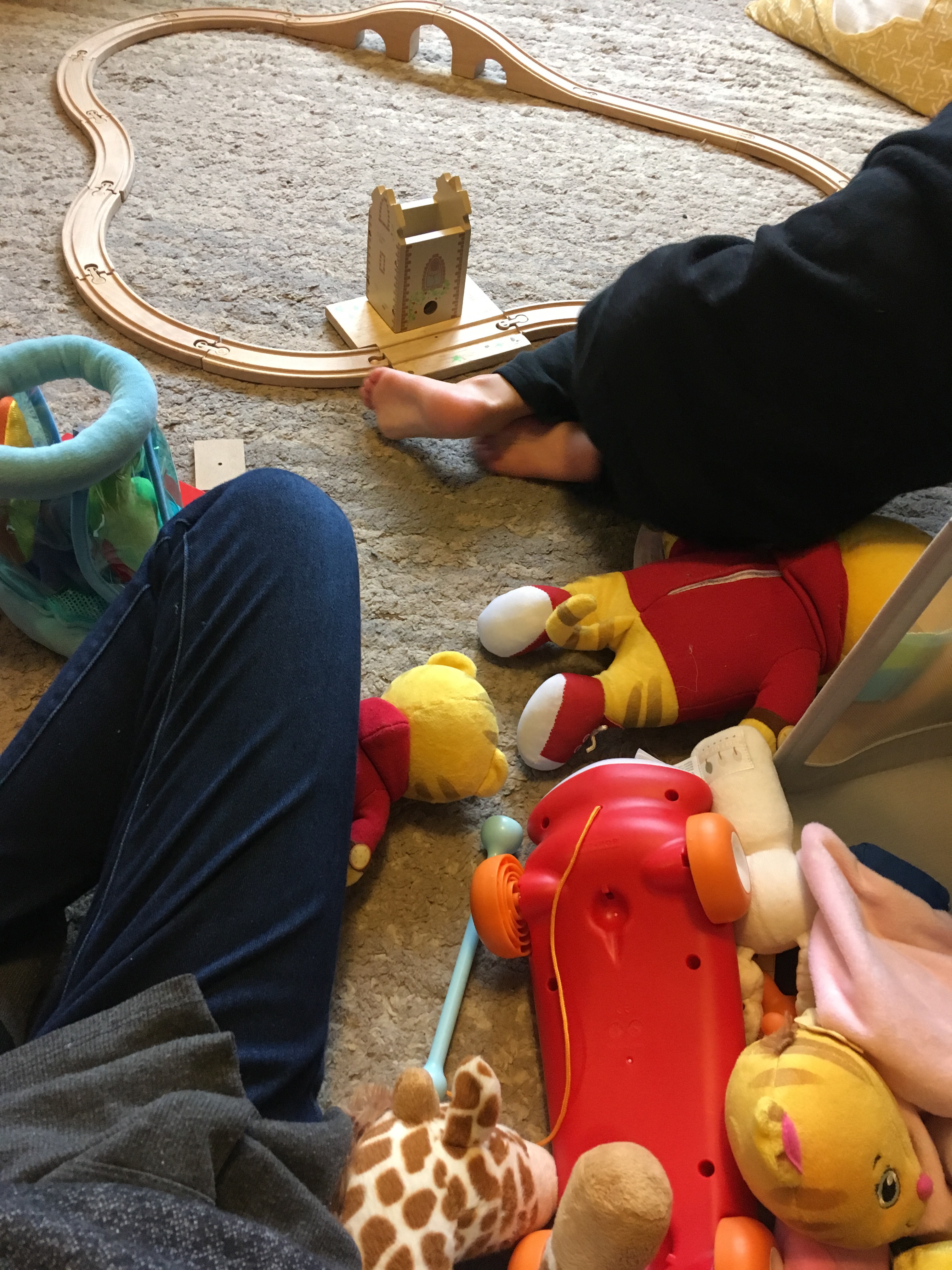
(On Instagram)
Sometimes the mess is sign of a growing, inquisitive, cruising baby. Sometimes it’s a reminder that, indeed, real people live in this house. Sometimes it’s a mark of generous hospitality— open doors and shared meals. This is where, I believe, people snap a photo and post it under #blessthismess.
But sometimes the mess isn’t material fit for social media. Sometimes the mess is in our hearts and in the hearts of our children. Sometimes it’s the mess of our trials, caused by sin (ours and others’), and evidenced by our troubled souls. We are disordered on the inside. And we need much more than God to “bless this mess”, as if we were sheepishly asking him to sprinkle some goodness on top of a sinkload of dirty dishes.
Most days, I need a better hope and greater grace. I need different prayers.
Like: God, by your power give me faith to trust you as I walk through this mess. You are too wise to err and too good to be unkind. I believe it, help my unbelief.
And God, forgive me for my part in creating this mess. Form in me a clean heart and renew in me a desire for you and your ways.
God, in your wisdom use this mess to make me more like Christ. Help me receive trials as discipline. You are working in me a harvest of righteousness and peace to come.
God, in your kindness give me grace as I deal with this mess, the fallout of sin. Your power is made perfect in weakness, and though I am weak, you are strong.
God, in your sovereignty redeem this mess. You are working all things, even this, for good— whether for me or for the sake of others— and though I can’t see what you’re doing now, turn this around for your glory.
God, this is the blessing we seek in spite of, through, with this mess.
Strengthened faith.
Clean hearts.
Holiness.
Grace.
Redemption.Kyrie Eleison, Lord have mercy
For your glory
In Christ’s name
Amen.
-

And the scribe said to him, “You are right, Teacher. You have truly said that he is one, and there is no other besides him. And to love him with all the heart and with all the understanding and with all the strength, and to love one’s neighbor as oneself, is much more than all whole burnt offerings and sacrifices.” And when Jesus saw that he answered wisely, he said to him, “You are not far from the kingdom of God.” And after that no one dared to ask him any more questions.
—
God, what’s your will for my life? I hounded God with the question as a highschooler, envisioning some sort of supernatural insight regarding majors and careers.
The reply he gave was frustrating at first. To love me and know me, he repeatedly said.
It was as if, standing at a fork in the road, I asked God what turn to take and he said instead, let me show you how you can always find the North Star.
Without a doubt, his answer has changed the course of my life.
—
A man speaking to Jesus asked a question of similar nature to mine. What is it that God wants most?, he wanted to know. Your heart, your soul, your mind, and your strength, Jesus replied. For you to love him. And after that, for you to love others. (Mk. 12:32-33)
Love God.
Love people.Here is Polaris.
I am needing to reorient myself these days because I’m hitting the same slump I did after my other kids. Inching (or barreling, how is it that it feels like both?) towards the 12-month mark of sleep-depriving infant care, the one year slump is different than the initial exhaustion of newborn days. I recognize it by my restlessness. It’s just a season, Jeff said recently about my being at home with our young kids. It’s a LONG season, I said back. The force of my reply both betrayed and surprised me, but the sentiment isn’t unfamiliar.
During my first year as a stay-at-home mom, God reworked my paradigm of productivity, fruitfulness, and service in God’s kingdom. I wrestled with living this strange disconnect between what I felt was true (namely that my work as a mom was valuable) and what I had up until then heard about what it meant to live a life unto God’s glory. But once I understood the vocation of motherhood was a calling to love little neighbors, I parented with purpose. I woke tired with long days ahead of me to the refrain, Love God, love neighbor.
Days caring for young children are full and repetitive, yet can feel frustratingly futile and impossible to schedule. Now that my youngest is becoming more independent, I feel the desire to do more. At the same time, my body feels the cumulative effects of sleep deprivation and the reality that baby girl still needs me a lot. Not only so, but there are school schedules, commutes, and other non-family related circumstances that seem to run my days. Thus, my restlessness and frustration. I want to have more energy, time, capacity for other endeavors. I want to feel fruitful and be passionate in service. Instead, I feel like I am stuck and fizzling out.
I know it’s not just in motherhood where it feels circumstances and seasons keep us from living fully unto God. We can be constrained, it seems, by singleness, by marriage, by children. We are limited in our ability to do God’s will, it feels, because of our job, location, church, and health. Different circumstances would give us a better shot at glorifying God, but we are just our limited selves, living within the boundaries set for us. And life keeps us from doing all we wish to do for him.
But what if the greatest commandment really is his greatest call for our lives?
If in all things, what God desires from us is love for him and others, our current seasons and circumstances are not constraints. Rather, they are the terrain we have been called to walk through as we trek northward.
Of all the possible points and places in history we could be in, God has determined our here and now. Scripture says he has assigned each person’s exact place and time so that we may reach out and find him (Acts 17:26-27). And having responded to this most important calling of our lives (to be reconciled to God), wherever we are, we can remain with him (1 Cor. 7:24) while walking into the good works he’s prepared for us in advance to do (Eph. 2:10). If where we find ourselves is right where he wants us, and what he wants for us most is to love him and neighbor, we are actually wondrously free to accomplish all he wants for us to do.
I remember when Jeff first taught me how to find the North Star. It was surprisingly simple: Find the Big Dipper. Follow the line from the outermost stars in the bowl to the tip of the Little Dipper. It may not be the brightest light in the sky, but there lies true north.
So, this is real time, two of my children asking me to read a book to them as I attempt to write? The baby shifting from arm to arm and on my hip having just woken up from a nap? These texts and calls that keep cutting off my train of thought? If I take a moment to reorient myself, I’ll confirm these as trail markers on the road of God and neighbor-love.
Love God.
Love others.Here is both the orienting call on my whole life and the simple task ahead of me. And though it feels like I’m barely trudging along right now, looking up, I know I am northbound.
-
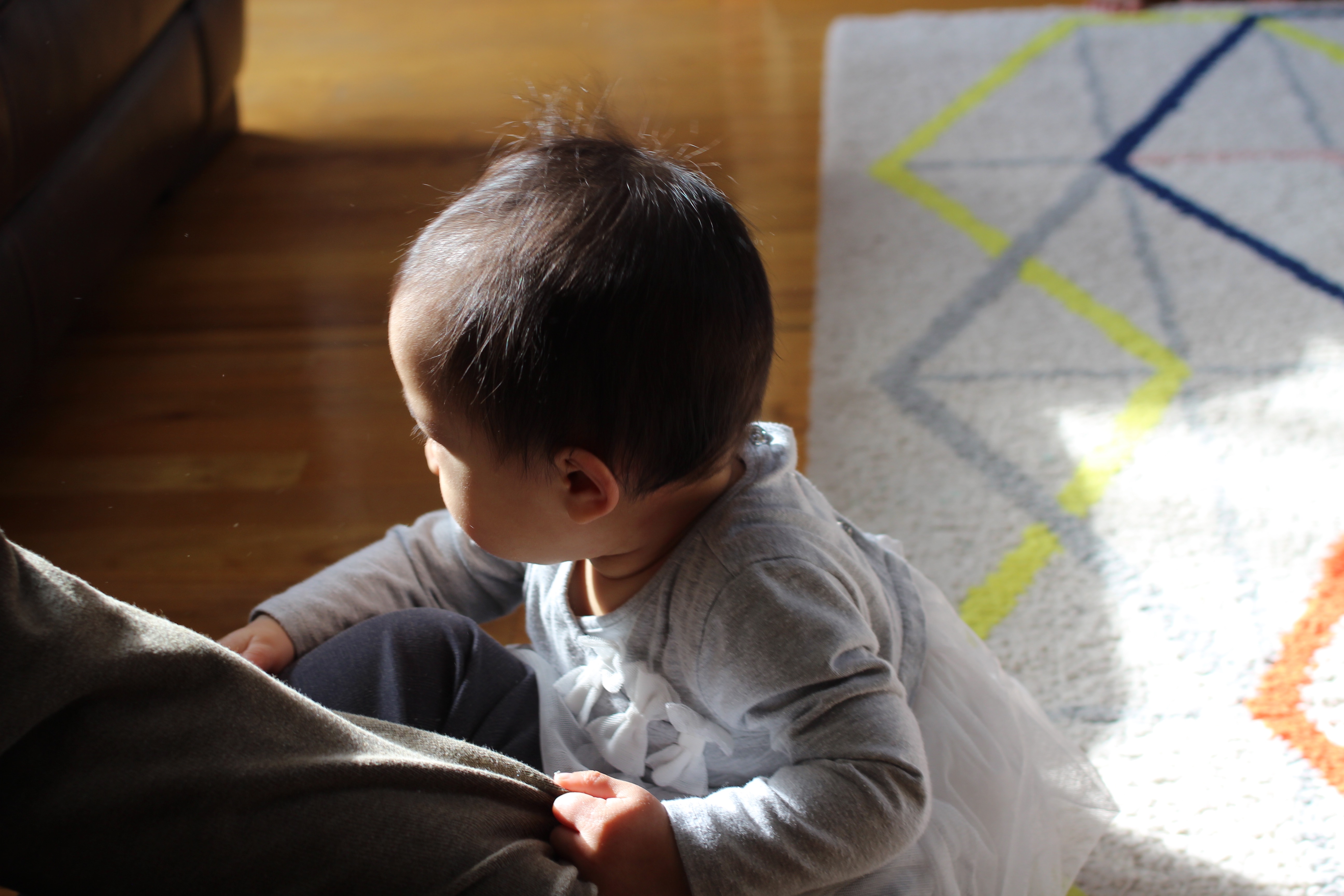
He leadeth me: O blessed thought!
O words with heavenly comfort fraught!
Whate’er I do, where’er I be, still ’tis God’s hand that leadeth me.
He leadeth me, he leadeth me, by his own hand he leadeth me;
his faithful follower I would be, for by his hand he leadeth me.
(He Leadeth Me, Joseph Henry Gilmore)I can’t believe she was born less than a year ago, I’ve been saying.
I suppose it’s time to start setting goals and planning for the decade, but today I’m still looking back. I only have approximately 10 journal entries for all of 2019, so I’ve been relying on my photos to jog my memory as I reflect.
The year started with my rounded belly. There’s that photo of me sitting in the church office when we thought I was going into labor early. The selfie from L&D. There are significant events like her welcome home and baptism. We’ve got some family trips in there. But mostly the camera roll is filled with everyday graces. Of learning, of friends, of play. And of children, imperceptibly but steadily and undeniably, growing.
I look back at a journal entry from twelve months ago, my list of hopes for the year, and I can’t say those have all panned out. What I thought would be important at the time wasn’t what was on my mind two days ago as the decade closed. Some desires, God hasn’t granted. Yet apart from what I have intentioned, my life has been brought to me moment by moment, and I have been changed.
It strikes me then that the thing that matters most about last year is this: I have been led through it.
As I think about 2020, I am hoping to keep some habits and lose others. I will, by grace, continue to bring to God yet unanswered requests. I still have some key words I want to try keep in focus. I want to follow Jesus more closely, to love and know him more deeply. But as I follow, I will rest in the truth that thus far he has led, and he will lead me still.
The other day as Jeff held the baby, she had a death grip on his shirt— as if she could fall while he held her up. So it is that though our following and God’s leading in many ways is one and the same, what matters much more than our sheepy resolve to follow, is our Shepherd’s commitment to lead. My hand holding onto my kids looks the same as theirs holding mine, but my vigilance matters the most as we walk.
Know this dear one, whatever the strength of your resolve, into each new day of the new year he goes before you. And at the close of each, he hems you behind.
Lead us, oh Lord. We follow after you.
-
Subscribe
Subscribed
Already have a WordPress.com account? Log in now.